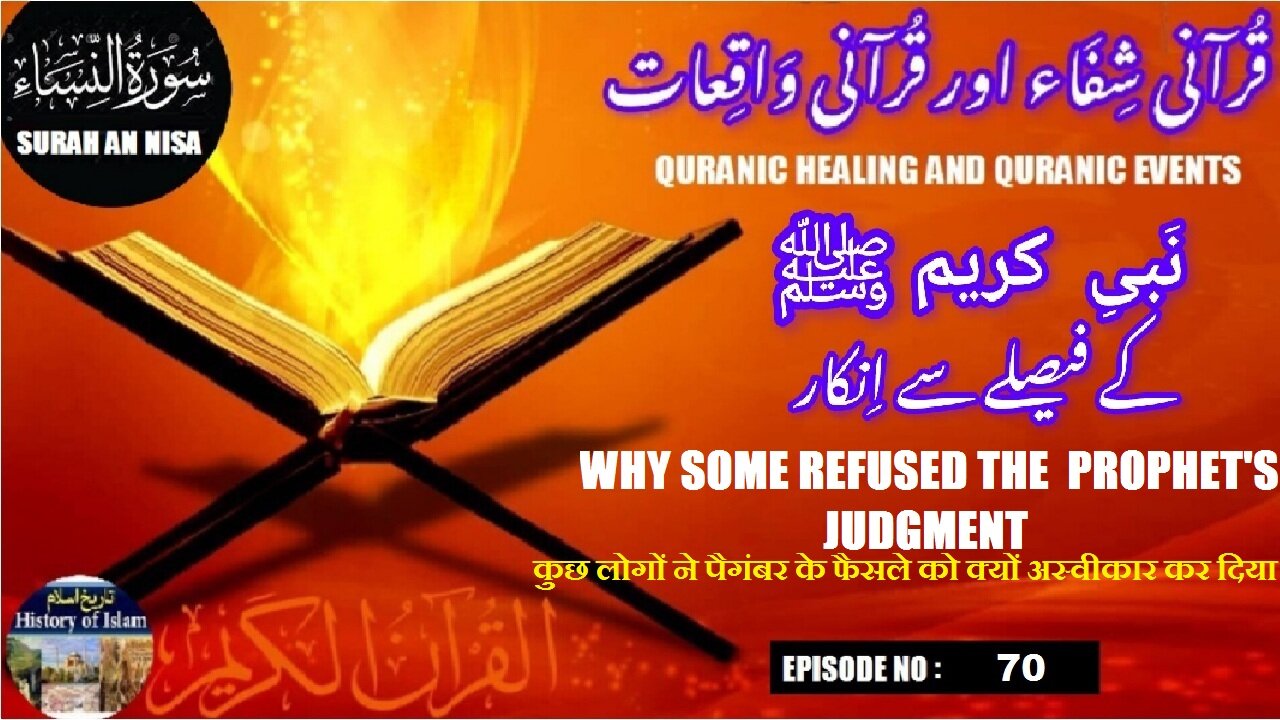Premium Only Content

Why Some Refused the Prophet’s Judgment کیوں کچھ لوگوں نے پیغمبر کے فیصلے سے انکار کیا؟
@islamichistory813 #healing #and #events #from #the #quran #historical #stories #and #events #quranicstories #selfhealing #success #stories #striking #events #in #history #quranstories, #storiesfromthequran #religious #creation #stories #trending #quran #short #historical #loves #historical #heroes #what #is #true #strength #calm #quran #recitation #for #babies #islamic #healing
Why Some Refused the Prophet’s Judgment
Brothers, sisters, friends and elders Assalamu Alaikum, wa Rahmatullahi wa Barakatuhu, we are presenting the 70th episode of the Islamic informative video based on healing and events from the Holy Quran, and in this video we will describe, Why Some Refused the Prophet’s Judgment
The Qur’anic verses 4:60–61 address a significant issue that arose within the early Muslim community—namely, the problem of false judgment seeking and the refusal to accept the Prophet Muhammad’s (peace be upon him) divinely appointed authority. These verses expose a group of people who claimed to believe in Islam outwardly but rejected the true source of justice by turning to *Taghut*—false gods, tyrants, or any authority that opposes the divine law—for judgment instead of submitting to the Prophet’s decisions. This incident highlights the deep tension between genuine faith and hypocrisy, and it reflects a broader theme of obedience, unity, and the challenges the Prophet faced in establishing a just society based on divine guidance.
Verse 4:60 explicitly confronts those who, despite professing faith, displayed a troubling attitude of disobedience and defiance. It states: “Have you not seen those who claim to have believed in what was revealed to you, \[O Muhammad], and what was revealed before you? They wish to refer legislation to *Taghut*, while they were commanded to reject it; and Satan wishes to lead them far astray.” This verse clearly condemns the act of seeking judgment from sources other than Allah and His Messenger. The term *Taghut* is often understood to mean false deities or tyrannical authorities that usurp God’s right to legislate. In the context of the early Muslim community, it referred to tribal leaders, pagan practices, or even stubborn individuals who refused to accept Islamic law. The verse underscores that turning to these sources for judgment is a deliberate rejection of divine authority and a grave act of misguidance, influenced by Satan to divert people from the straight path.
The seriousness of this act lies not only in the refusal to obey the Prophet’s decisions but also in the undermining of the community’s cohesion and the establishment of justice. The Prophet Muhammad was sent as the final messenger and lawgiver, and his judgments were to be the binding authority for Muslims. When individuals choose to reject this system and instead rely on alternative authorities, they create divisions, foster confusion, and weaken the foundations of the Muslim community. This refusal to accept the Prophet’s judgment was not merely a difference of opinion; it was an open challenge to the divine system of governance and law.
Verse 4:61 continues the narrative by describing the behavior of those who, after receiving a judgment they disliked, would reject it outright and turn away in anger: “And when it is said to them, ‘Come to what Allah has revealed and to the Messenger,’ you see the hypocrites turning away from you in aversion.” This verse is believed to refer to a specific incident involving a prominent hypocrite who persistently refused to abide by the Prophet’s rulings. While some commentators suggest this refers to Abd Allah ibn Ubayy, the leader of the hypocrites in Medina, the verse broadly captures the attitude of all who displayed such defiance. The hypocrites outwardly professed Islam to blend in with the community, yet inwardly resisted the Prophet’s authority and sought to impose their own agendas.
Their turning away in aversion was more than mere disagreement; it was an act of rebellion and deception. By rejecting the divine law and the Messenger’s judgment, they not only isolated themselves spiritually but also endangered the unity and security of the Muslim community. Their actions threatened to fragment the social order and open the door to further discord and conflict. The Qur’an’s strong language in addressing these individuals serves as a warning to all believers about the dangers of hypocrisy and disobedience.
The incident of false judgment seeking reveals a profound lesson about the relationship between faith and submission. True belief in Islam is inseparable from submission to Allah and His Messenger. Faith requires trust in the divine wisdom and acceptance of the legal and moral framework revealed by God. When individuals place their own desires, tribal loyalties, or worldly interests above this framework, they deviate from the path of true Islam. The Qur’an, through these verses, emphasizes that legitimacy and justice come only through adherence to divine revelation and prophetic guidance.
Moreover, this episode highlights the challenges the Prophet faced in consolidating the Muslim community amid internal opposition. The hypocrites and disobedient individuals exploited social and political tensions to resist the establishment of a just order. Their refusal to accept the Prophet’s judgment was symptomatic of their broader rejection of Islam’s transformative message. Yet, the Qur’an reassures the believers that such challenges are part of the test of faith and calls for patience, steadfastness, and unwavering commitment to divine guidance.
The message of these verses remains relevant across time and contexts. The problem of seeking “false judgment” can be understood in broader terms today as turning to illegitimate or corrupt authorities rather than upholding justice and truth. Whether in personal affairs, legal disputes, or governance, the principle that ultimate authority belongs to just and ethical leadership grounded in truth remains central to Islamic ethics. The Qur’an’s warning against choosing false paths over rightful ones serves as a timeless reminder to evaluate the sources of authority we follow and to align ourselves with principles of justice and righteousness.
In summary, verses 4:60–61 highlight a pivotal moment in Islamic history where certain individuals professed faith but sought judgment from false sources instead of submitting to the Prophet Muhammad’s divinely ordained authority. This act of false judgment seeking is condemned as hypocrisy and rebellion against divine law. The verses teach that true faith demands acceptance of prophetic guidance and legal rulings, emphasizing the dangers of disobedience and division within the community. They call believers to uphold justice, unity, and submission to Allah’s revealed wisdom—principles that remain fundamental to Islam’s moral and social vision to this day.
With this, we ask for your permission until tomorrow and pray to Allah Almighty to grant us the ability to act on the Quran and Hadith, Amen
Allah Hafiz
============================
-
 12:45
12:45
ISLAMIC HISTORY
1 hour agoKhalid bin Walid (RA) Islamic Warrior Episode 64 خالد بن ولید رضی اللہ عنہ اسلامی جنگجو قسط نمبر
1 -
 15:05
15:05
GritsGG
1 day agoFlawless Duos Victory w/ Most Winning Duo in Warzone History!
32.5K2 -
 1:53:52
1:53:52
FreshandFit
17 hours agoShe Was In 3 Domestic Violence Cases? Happy Birthday Fresh!!!
161K57 -
 2:03:22
2:03:22
Inverted World Live
9 hours agoThe Aliens Are Underwater | Ep. 117
78.8K29 -
 2:20:24
2:20:24
Badlands Media
17 hours agoDevolution Power Hour Ep. 394: The Long Game, Media Traps, and Military Signals
97.7K30 -
 2:08:38
2:08:38
TimcastIRL
11 hours agoNetflix Shares TANK, Elon Says BOYCOTT After Writer MOCKS Charlie Kirk Assassination
252K194 -
 8:48:01
8:48:01
SpartakusLIVE
13 hours agoI'M BACK || Quads w/ The Boys
95.4K9 -
 9:33
9:33
Ken LaCorte: Elephants in Rooms
16 hours ago $4.37 earnedWhy Do Black Men Love Big Butts?
41.3K26 -
 2:12
2:12
From Zero → Viral with AI
1 day ago $14.74 earned🚀 AI Marketing Isn’t Just for Big Brands Anymore — Here’s Why
55.9K11 -
 9:51:58
9:51:58
Dr Disrespect
20 hours ago🔴LIVE - DR DISRESPECT - 10 WINS ON CONTROLLER - BO7 TOMORROW
321K22